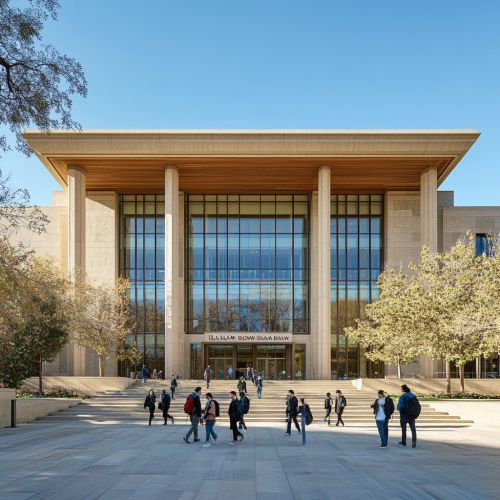Stanford Program in Law and Society
Overview
The Stanford Program in Law and Society is an interdisciplinary initiative at Stanford University, designed to foster research and education at the intersection of law and social sciences. The program aims to explore how legal institutions, practices, and norms interact with various societal factors, including culture, politics, and economics. It serves as a platform for scholars, practitioners, and students to engage in critical discussions and collaborative research projects that address complex legal and societal issues.
History
The Stanford Program in Law and Society was established in response to the growing recognition of the importance of interdisciplinary approaches in understanding legal phenomena. The program was founded to bridge the gap between traditional legal studies and the social sciences, drawing on Stanford University's strengths in both areas. Over the years, it has evolved to include a wide range of activities, including conferences, workshops, and research projects, aimed at advancing knowledge and fostering dialogue among scholars from diverse disciplines.
Academic Focus
The program's academic focus is broad, encompassing various aspects of law and society. Key areas of interest include:
Legal Institutions and Social Change
This area examines how legal institutions influence and are influenced by social change. It explores the role of law in shaping social norms, addressing inequality, and promoting justice. Scholars in this field investigate the dynamics between legal reforms and societal transformations, considering factors such as globalization, technological advancements, and cultural shifts.
Law and Economics
The intersection of law and economics is another critical focus of the program. This area explores how economic theories and principles can inform legal analysis and policy-making. Topics of interest include the economic impact of legal regulations, the role of law in market functioning, and the implications of economic inequality for legal systems.
Law and Politics
The relationship between law and politics is a central theme in the program's research agenda. Scholars examine how legal systems are shaped by political forces and how law, in turn, influences political processes. This includes studies on the role of courts in democratic governance, the impact of legal decisions on policy outcomes, and the interplay between legal and political institutions.
Cultural Dimensions of Law
Understanding the cultural dimensions of law is crucial for comprehending how legal systems operate in different contexts. The program explores how cultural beliefs, values, and practices shape legal norms and institutions. This includes research on legal pluralism, the role of culture in dispute resolution, and the impact of cultural diversity on legal systems.


Research and Publications
The Stanford Program in Law and Society supports a wide range of research activities, including collaborative projects, individual research endeavors, and interdisciplinary studies. The program encourages the publication of research findings in academic journals, books, and other scholarly outlets. It also hosts conferences and workshops that bring together leading scholars to discuss cutting-edge research and emerging issues in law and society.
Educational Initiatives
The program offers various educational initiatives aimed at enhancing the understanding of law and society among students and practitioners. These include:
Courses and Seminars
The program offers a range of courses and seminars that cover topics at the intersection of law and social sciences. These courses are designed to provide students with a comprehensive understanding of the theoretical and practical aspects of law and society.
Fellowships and Scholarships
To support the next generation of scholars, the program offers fellowships and scholarships to students pursuing research in law and society. These opportunities provide financial support and mentorship to help students develop their research skills and contribute to the field.
Public Engagement
The program is committed to engaging with the broader public on issues related to law and society. It organizes public lectures, panel discussions, and community events that aim to raise awareness and foster dialogue on important legal and societal issues.
Collaborations and Partnerships
The Stanford Program in Law and Society collaborates with various academic institutions, research centers, and organizations to advance its mission. These collaborations facilitate the exchange of ideas, resources, and expertise, enhancing the program's ability to address complex legal and societal challenges. Partnerships with international institutions also provide opportunities for comparative research and global perspectives on law and society.
Impact and Future Directions
The Stanford Program in Law and Society has made significant contributions to the field by advancing interdisciplinary research and education. Its work has informed policy debates, influenced legal reforms, and contributed to a deeper understanding of the complex relationship between law and society. Looking ahead, the program aims to expand its research agenda, strengthen its educational offerings, and continue fostering collaborations that address pressing legal and societal issues.
